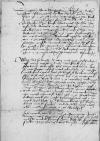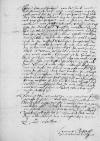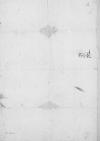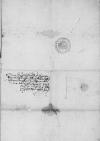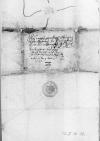Mir ist E(wer) G(naden) ⌊⌋ eigener hant von(n) ⌊Krako⌋ durch meyn(n) sundren(n) freundt und bruder, hernn(n) ⌊Nibschiczen(n)⌋, zu komen(n), / das mich herczlich hot erfreudt, / daraus E(wer) G(naden) gnedigen(n), freuntlichenn(n) willen(n) gen mir / vorstanden(n) / mit solchen erbittenn(n), / das ich um(m)b E(wer) G(naden) nye hab vorschuldet / noch vordynet. / Bedanck mich der halben(n) gen E(wer) G(naden) uff das allerhochste, / wil ouch solcher grosser, unvordinter freuntschaff, / dar in mich E(wer) G(naden) genomen(n), / nu(m)mer undanckpar gefunden(n) werden(n), / und das wirt mit der zceit E(wer) G(naden) uffentlich spuren(n) un(n)d befinden(n) etc.
Was das belangt, / do von mir E(wer) G(naden) geschribenn(n), / uff mein(n) negsten(n) ⌊⌋ von(n) ⌊Krako⌋ an E(wer) G(naden) gegebenn(n), / bedorffte ein(n) lang antwurt, / das so mit papir nicht wol oder sicher ist auszurichtenn(n). / Wil das selbtige so berhwen(n) lossen(n), biss ich selbst mich zu E(wer) G(naden) mag vorfuegenn(n) / und do mit E(wer) G(naden) willen(n) un(n)d meynem(m) hochem(m) beger genug muge geschen(n). / So ich mich von(n) hynnen(n) zu der ⌊tagfart⌋ uff sant Michel[2] gen(n) ⌊Marienburg⌋ mues begeb(e)n / und von(n) dannen(n) straks aus ein andern(n) weg vor mich nhemen(n), / thu ich E(wer) G(naden) hochlich bitten(n), wold sich nicht besveren(n), / das ich E(wer) G(naden) noch dem(m) tage zu Marienburg / zu ⌊Resenburg⌋ mocht finden(n) / und do selbst mich noch aller nottorfft mit E(wer) G(naden) bereden(n).
Ich wold gern(n) E(wer) G(naden) vil gutter, newer zceytungen(n) von(n) hynnen(n) schreiben(n). / So ist an mich nichts anders komen(n), / dan das der h(e)rn ⌊Fugger⌋ factor ⌊Jorg Mulich⌋ von(n) ⌊Bresla⌋ negst genn(n)  GStA, PK, HBA, C 2, No 28, f. 1v ⌊Thorn(n)⌋ hot geschriben(n), / wie der ⌊Turk⌋ mit al seiner gewalt / acht meil wegs noch ⌊Hungern(n)⌋ sey zu rucken(n) geczogen(n) / und hab das stettlen(n) ⌊Guns⌋, / das der ⌊Imbrey Basscha⌋ vil tag het belegert / und V. sturme dar vor verloren(n), / mit solchen(n) tedingen(n) gelossen(n). / Ins erst liss her durch eyn(n) basscha mit dem(m) houptman on the margin⌈manman on the margin⌉ des ⌊stettlens⌋, eynem(m) tapferen(n) man(n)e, redenn(n), das her sich im in sein dinst ergebe, / wold im das stettlen und ander heru(m)mer erblich geben(n). Und do her dissen(n) wedlichen(n) houptman(n) dar zu nicht mocht bringen(n), / do mit mit ehrenn(n) die belegrung abzcuge, / liss her mit im handlen(n), / so ⌊Wien⌋ gewo(n)nen(n) wurd, / das her sich ouch ergebe. / Hiruff, / so der houptman(n) kein(n) pulver mher und weynig gehabt p(ro)fant, / hot sich lossen(n) bereden(n) / wissende, das ⌊Wien⌋ so mit aller nottorfft besorget, das es diss jor bleib ungewonnen(n). / Und wie der schreibt, / das die ⌊Turken(n)⌋ kein slacht wollen(n) geliffern(n), / des ich mich alzeit besorget. / Idoch hab ich von(n) ⌊kay(serliche)r m(aieste)t⌋ und vom(m) ⌊romschen(n) konige⌋ gehort, / so die ⌊Turken(n)⌋ der slacht sich wolden(n) enczyhen(n), / das sie mit aller macht wolten(n) noch seczen(n). / Got gebe glug uff unser seitten(n) etc.
GStA, PK, HBA, C 2, No 28, f. 1v ⌊Thorn(n)⌋ hot geschriben(n), / wie der ⌊Turk⌋ mit al seiner gewalt / acht meil wegs noch ⌊Hungern(n)⌋ sey zu rucken(n) geczogen(n) / und hab das stettlen(n) ⌊Guns⌋, / das der ⌊Imbrey Basscha⌋ vil tag het belegert / und V. sturme dar vor verloren(n), / mit solchen(n) tedingen(n) gelossen(n). / Ins erst liss her durch eyn(n) basscha mit dem(m) houptman on the margin⌈manman on the margin⌉ des ⌊stettlens⌋, eynem(m) tapferen(n) man(n)e, redenn(n), das her sich im in sein dinst ergebe, / wold im das stettlen und ander heru(m)mer erblich geben(n). Und do her dissen(n) wedlichen(n) houptman(n) dar zu nicht mocht bringen(n), / do mit mit ehrenn(n) die belegrung abzcuge, / liss her mit im handlen(n), / so ⌊Wien⌋ gewo(n)nen(n) wurd, / das her sich ouch ergebe. / Hiruff, / so der houptman(n) kein(n) pulver mher und weynig gehabt p(ro)fant, / hot sich lossen(n) bereden(n) / wissende, das ⌊Wien⌋ so mit aller nottorfft besorget, das es diss jor bleib ungewonnen(n). / Und wie der schreibt, / das die ⌊Turken(n)⌋ kein slacht wollen(n) geliffern(n), / des ich mich alzeit besorget. / Idoch hab ich von(n) ⌊kay(serliche)r m(aieste)t⌋ und vom(m) ⌊romschen(n) konige⌋ gehort, / so die ⌊Turken(n)⌋ der slacht sich wolden(n) enczyhen(n), / das sie mit aller macht wolten(n) noch seczen(n). / Got gebe glug uff unser seitten(n) etc.
Hiermit thu ich mich in E(wer) G(naden) gnedige freu(n)tschafft befelen(n) / und bit, mich wold mit den(n) erst(e)n lossen(n) wissen(n), / voczu das E(wer) G(naden) gewilliget ist. / Got der almechtig geb E(wer) G(naden) ein gesunt, langwerig leben(n) und zu allenn(n) zceiten(n) glugszelig zunhemen(n).
 GStA, PK, HBA, C 2, No 28, 1 unnumbered
GStA, PK, HBA, C 2, No 28, 1 unnumbered  GStA, PK, HBA, C 2, No 28, f. 1r
GStA, PK, HBA, C 2, No 28, f. 1r  GStA, PK, HBA, C 2, No 28, f. 1v
GStA, PK, HBA, C 2, No 28, f. 1v 